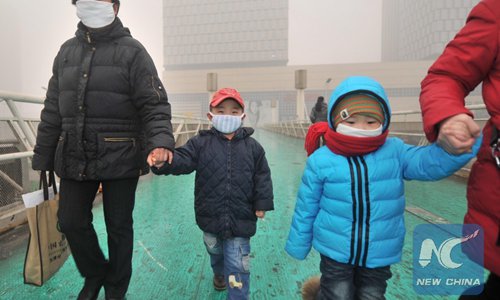HOME >> CHINA
China issues anti-pollution plan for north region
By Sun Haoran and Xu Keyue Source:Global Times Published: 2019/10/16 22:18:40

File photo: Xinhua
Chinese authorities published a comprehensive plan to control air pollution in Beijing, Tianjin, North China's Hebei Province as well as surrounding areas which could experience heavy air pollution in autumn and winter.
The plan issued by the Ministry of Ecology and Environment said the average PM 2.5 concentration in the regions in autumn and winter should be reduced by 4 percent year-on-year, and the number of days with heavy pollution or above should drop by 6 percent.
The report said that although China's air quality has continued to improve, air pollution is still serious in the Beijing-Tianjin-Hebei region and surrounding areas in autumn and winter.
According to the report, the average concentration of PM 2.5 in the region increased by 6.5 percent year-on-year, and the number of heavily polluted days increased by 36.8 percent in autumn and winter from 2018 to 2019.
The plan called on Tianjin to shut down one 588-cubic-meter blast furnace of the Rockcheck Group, Hebei Province to reduce its steel production by 14 million tons, and North China's Shanxi Province and East China's Shandong Province to cut their excessive industrial capacities.
All the cities in this region must replace 5.42 million tons of loose coal into gas and electricity to promote clean heating. Among them, 363,000 households are affected in Tianjin, 2.03 million in Hebei, 397,000 in Shanxi, 1.14 million in Shandong, and 1.31 million in Central China's Henan Province.
The plan also called for an investigation of excessive discharges of motor vehicles, reducing road dust, supervising open burning and strengthening the construction of the automatic monitoring system for pollution sources.
"The Beijing-Tianjin-Hebei region has been suffering from severe air pollution due to poor natural conditions, low vegetation coverage, dense population and industry, and the burning of coal," Zhang Yuanxun, an environmental science expert at the Chinese Academy of Sciences in Beijing, told the Global Times.
"If the government eliminates polluting enterprises in a short period of time, it may result in a loss of income sources in poverty-stricken areas within the region," said Zhang.
Posted in: SOCIETY,ENVIRONMENT,CHINA FOCUS